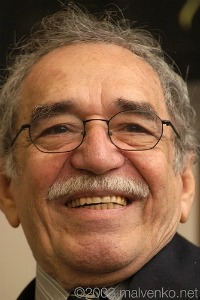Gabriel Garcia Marquez Suffers From Dementia, Brother Confirms
 By Voxxi
By Voxxi
For months now, rumors have been circulating about Nobel Prize Gabriel “Gabo” Garcia Marquez and his battle with cognitive impairment. Now, the BBC reports that Gabo’s brother Jaime Garcia Marquez has confirmed that the Colombian author is in fact suffering from dementia.
“He has problems with his memory,” he’s reported saying to his students during a lecture in Cartagena. “Sometimes I cry because I feel like I’m losing him.”
Jaime Garcia Marquez says his brother often calls him on the phone to ask basic questions, and while the dementia has been aggravated by chemotherapy from Gabo’s lymphatic cancer struggles in 1999, the condition does run in the family.
“He is doing well physically, but he has been suffering from dementia for a long time,” Jaime Garcia Marquez said. “From a physical standpoint he’s doing well, although he now has some memory lapses.”
News of Garcia Marquez’s condition had been kept secret, said his brother, because the author always strove to protect his private life. With so many rumors circulating, however, Jaime Garcia Marquez knew it was time to break the silence.
The writer’s youngest brother has also confirmed speculations that Gabo will never write again and that the Nobel Prize winner’s autobiography will remain unfinished.
“Unfortunately, I don’t think that’ll [writing again] be possible, but I hope I’m wrong,” he said.
What is dementia?
Dementia is not a term used to classify one specific disease. Instead, dementia refers to classic groups of symptoms involved in cognitive impairment conditions. It is a loss of brain function often associated with other diseases like Alzheimer’s, Pick’s and Parkinson’s disease, as well as multiple sclerosis, and progressive supranuclear palsy.
In some cases, dementia can be caused by:
- Brain injury
- Low levels of vitamin B12
- Metabolic changes
- Alcohol abuse
- Tumors within the brain
- Age (seniors)
In cases of dementia not related to a disease or aging process, the cognitive impairment can often be reversed.
What are the symptoms?
Memory loss alone does not mean a person has dementia. At least two symptoms of cognitive impairment must be identified before such a diagnosis can be made.
Symptoms of dementia include:
- Memory loss
- Trouble communicating
- Paranoia
- Hallucinations
- Loss of basic motor function
- Personality and emotional changes
- Poor judgment
- Social withdrawal
- Inability to recognize family and friends
Age- and disease-related dementia cannot be cured, but the symptoms can be treated and complicating problems can be addressed. Many people — especially those most at risk (the elderly, those with a family history, and people with Down syndrome) — experience external stress factors that can make symptoms of dementia worse.
Stressors include:
- Poor nutrition
- Abuse from caretakers
- Decreased hygiene
- Increased frequency of illness
- Trouble sleeping
- Difficulty communicating
Treatment for dementia
Because dementia describes many different levels of mental deterioration, treatment can vary between individuals. Most cases are treated with medications designed to improve the chemical messaging system within the brain. By boosting levels of chemical messengers, improvement can be seen in areas of judgment, memory and learning.
People with curable dementia must make a lifestyle change, stopping chronic alcohol use, eliminating delirium-causing medications, treating high cholesterol and diabetes, and quitting smoking.
Unfortunately, most cases of dementia are not curable and will result in a shortened lifespan and a decreased quality of life.
The underlying cause and severity of Gabriel Garcia Marquez’s dementia have not been revealed yet.
This article was first published in Voxxi.
[Photo by *malvenko]
